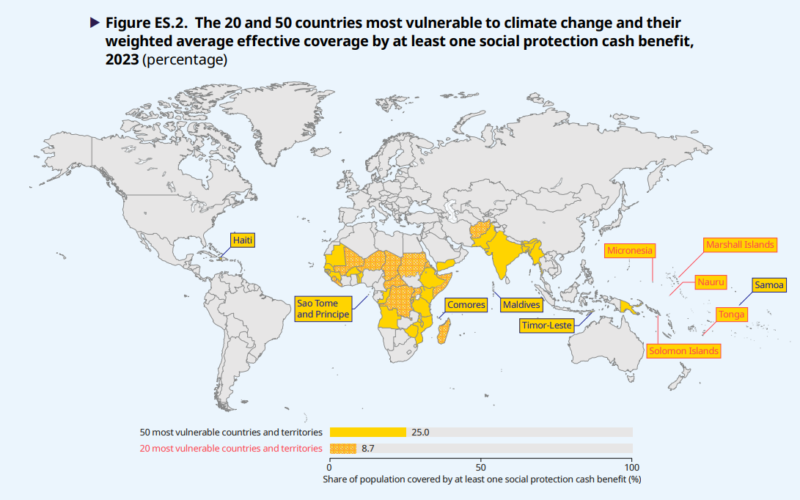In 2023, the Asia-Pacific region reached a significant milestone, with over half (53.6%) of its population covered by at least one social protection benefit for the first time, according to a new report by the International Labour Organization (ILO). Despite this progress, social protection systems across the region face ongoing and transformative challenges, particularly in their capacity to mitigate the effects of climate change on vulnerable populations.
The ‘Regional Companion Report for Asia and the Pacific of the World Social Protection Report 2024-26: Universal Social Protection for Climate Action and a Just Transition’ reveals that the region’s effective social protection coverage now surpasses the global average of 52.4%. Nevertheless, approximately 2.1 billion people in Asia-Pacific remain unprotected from various life-cycle and socio-economic risks, and progress has been uneven across countries.
Since 2015, social protection coverage has notably increased in several subregions: Eastern Asia’s coverage rose by 15.2 percentage points (from 63.3 to 78.5%), South-Eastern Asia’s by 13.4 percentage points (from 32.5 to 45.9%), Southern Asia’s by 16.7 percentage points (from 18.7 to 35.4%), and the Pacific Islands’ by 6.8 percentage points (from 65.7 to 72.5%). Despite these gains, significant disparities remain between countries.
The report also highlights challenges related to the adequacy of benefits and the financial sustainability of social protection systems. In 2023, the region allocated just 11.8% of its GDP to social protection, significantly lower than the global average of 19.3%.
A gender gap persists in social protection coverage, with women being 6.8 percentage points less likely than men to receive at least one benefit. This gap is particularly pronounced in Southern Asia, where it stands at 11.1 percentage points.
“While the progress made since 2015 in the region as a whole is promising, there is still a considerable way to go to attain universal coverage and to reach adequate and comprehensive protection. Investing in comprehensive and resilient social protection systems has never been as urgent as it is today,” said Chihoko Asada-Miyakawa, ILO Assistant Director-General and Regional Director for Asia and the Pacific.
With the region home to 16 of the 50 most climate-vulnerable countries, the report stresses that well-designed and funded social protection systems are crucial for mitigating climate change impacts. These systems can provide income protection for those affected by climate policies and support the transition to a green economy.
“It is particularly concerning that many countries in Asia and the Pacific are experiencing a high vulnerability to climate change yet have low effective coverage. Social protection will play a vital role in supporting climate adaptation and mitigation efforts, and in facilitating a just transition, ultimately enhancing the resilience of all, and especially vulnerable communities,” said Kenichi Hirose, Senior Social Protection Specialist at the ILO Decent Work Technical Support Team for East and South-East Asia and the Pacific.






















